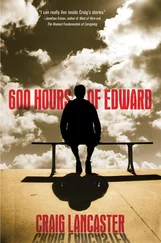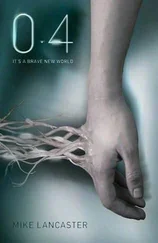I sip my sugar-free hot chocolate and I wait for her to finish.
I’m going home, but there’s nothing for me there.
I am adrift. I hate that word.
— • —
I’m leaving the bathroom—this medicine continues to make me pee prodigiously (I love the word “prodigiously”)—and passing by the door to Kyle’s room. He cracks it open and speaks to me.
“Don’t let them make you leave,” he says.
I look around, afraid that we’ll both be in trouble, but Donna can’t hear him. She’s in the kitchen cutting vegetables for dinner.
“Kyle, you’re not supposed to be out here.”
“Screw her.”
“ Kyle .”
“Why are they making you leave?”
If he’s managed to eavesdrop enough to know that I will be going home, he should know the answer to his own question. Still, I tell him.
“Because you’re being bad and they don’t know what to do. I’ll get in the way.”
For just a moment Kyle looks mad, and I brace myself in anticipation that he will call me another name that hurts my feelings. But he doesn’t do that. He’s just defiant.
“So what? They’re doing it because they want to punish me. And you’re going to leave because you want to punish me, too.”
“I don’t want to punish you.”
“Then why are you leaving?”
“Because your mom thinks it would be better if I did.”
“She’s wrong.”
“She’s very logical, Kyle.”
“You’re wrong.”
“I don’t think so. We’ll have to see what the facts bear out.”
Donna’s voice calls out from the kitchen. “Edward, can you help me with something real quick?”
“Close the door,” I tell Kyle.
“Don’t let them make you leave.”
“Close it!”
Kyle, at last, does as he’s told.
I head for the kitchen.
I’m flummoxed, to say the least. No, I guess to say the least would be to say nothing at all—another phrase that doesn’t make much sense.
TECHNICALLY TUESDAY, DECEMBER 13, 2011
It’s 4:47 a.m.
My father visited my dreams again. This is not an altogether rare occurrence, especially since he’s been dead, but my recent dreams about him have deviated from the norm in that they’ve been set earlier in my life, when I was just a boy. Most of the time, my father appears in my dreams as I knew him around the time he died, and I am generally around the age I was then or am now. I don’t like to use phrases such as “most of the time” and “generally,” as they provide no precision about the frequency of occurrence, but dreams are hard to enumerate (I love the word “enumerate”) and categorize. Science has proved that all mammals dream, and I certainly am a mammal, but just because I have dreams doesn’t mean I remember all of them when I am awake. Sometimes I can’t remember a single dream. Sometimes I remember only pieces of dreams and it’s hard to make sense of them in the conscious world. And sometimes I remember entire dreams with vividness, as if they were a movie or a TV show I watched. When my father appears in a dream, for better or for worse, I remember it in the latter way.
This time we were again in Cheyenne Wells, Colorado, on that long-ago trip, only it was a blend of that time and a time much earlier, one I’ve only read about in books. My father and I were out in the oil fields, where he oversaw a crew of men who were doing cathodic protection on oil pumps to keep them from corroding. That image is based on something that really happened. While in the field, in my dream, we met up with two men who were traveling in a wagon train, and this is where the dream becomes illogical. They introduced themselves as John Charles Fremont and Charles Preuss, and although this seemed perfectly natural in my dream, as I sit here now, eyes open, I know it is absurd. They were men of the 1840s. Fremont was a man who made important expeditions to the West, seeing many things in this part of the country before any other white man did, and Preuss was his long-suffering cartographer, who hated the very thing he was great at doing.
In my dream, my father told me that Fremont and Preuss were men who had the courage to set out for frontiers that no one had seen before. The actual truth of the matter is that my father never said any such thing. If he knew anything about Fremont or Preuss, I never heard him talk about them. Furthermore, I know for a fact that my knowledge of both men comes from books and television. The question of how my brain came to blend Cheyenne Wells—which is far south of where Fremont and Preuss traveled—with two early-nineteenth-century explorers is likely to remain a mystery. There is just no logical explanation for it, and I am a person who values logic over all else.
So now I lie on my back and try to make sense of something that defies conventional order, and this is perhaps the hardest thing anyone can ask me to do. In the time I’ve been on this trip, my father has shown up in my dreams twice, both times we have been in Cheyenne Wells, Colorado, and I have been a little boy. I wonder what that means, or if it means anything at all. If I were an oneirologist, which is a person who studies dreams, I might have some basis for understanding this. I am not an oneirologist. And what of Fremont and Preuss? I can’t make sense of that, either. I remember watching a program on their expeditions and thinking that Preuss was the kind of person I would like, because he was very particular about things, just like I am. This quality made him a good cartographer but a bad explorer, and the program noted that Preuss never seemed to grasp the import of the things he saw. For example, Preuss once happily wrote in his journal that some of the men in the traveling party had successfully negotiated with the Indians for some salt, which would make their food taste better. The program I saw noted that Preuss said nothing about the fact that they discovered Lake Tahoe around the same time. The narrator seemed to find this humorous, but, to be honest, I saw Preuss’s side of it. It’s hard to be impressed by big things when the little things are all messed up. He just wanted his salt, just like I want to know why I am adrift and why I’m being shown these things in my dreams.
There is a deductive device called Occam’s razor. The way it works is that when someone is trying to sort through multiple possible explanations for something, the hypothesis (I love the word “hypothesis”) that makes the fewest assumptions is generally the correct one. In other words, the simplest explanation is the best explanation, until and unless more information emerges that suggests a different reason. I like Occam’s razor for a lot of reasons, but the disdain for assumptions is my favorite part of it.
I decide to apply Occam’s razor to things. I turn on the bedside light, pull a notebook from my bag, and begin writing.
1. I came here to help Kyle, but he’s beyond my reach.
2. I also came here because I was feeling adrift.
3. I still feel adrift.
4. My father has visited my dreams twice, and both times he has been with me in Cheyenne Wells, Colorado.
5. John Charles Fremont and Charles Preuss visited my dreams, and they were explorers who mapped the way for others.
6. I need to find my way, and it doesn’t seem that anyone can map it for me.
7. Though I have to leave Boise, I don’t have to go home. I have eight days, including this one, before I leave Billings for Texas.
8. I’m going elsewhere. I think I will go to Cheyenne Wells, Colorado. Even if my father’s appearance there in my dreams is completely random, I would like to see the town again.
9. I’m done with the list now.
10. Now.
11. Shit.
I’m determined to stop writing, even though the last thing on my list is a curse word and an odd number. I manage to do it—I’m very proud—but I have to snap the pen in half to keep from writing down the number 12.
Читать дальше












![Edward Ellis - Adrift on the Pacific - A Boys [sic] Story of the Sea and its Perils](/books/753342/edward-ellis-adrift-on-the-pacific-a-boys-sic-s-thumb.webp)